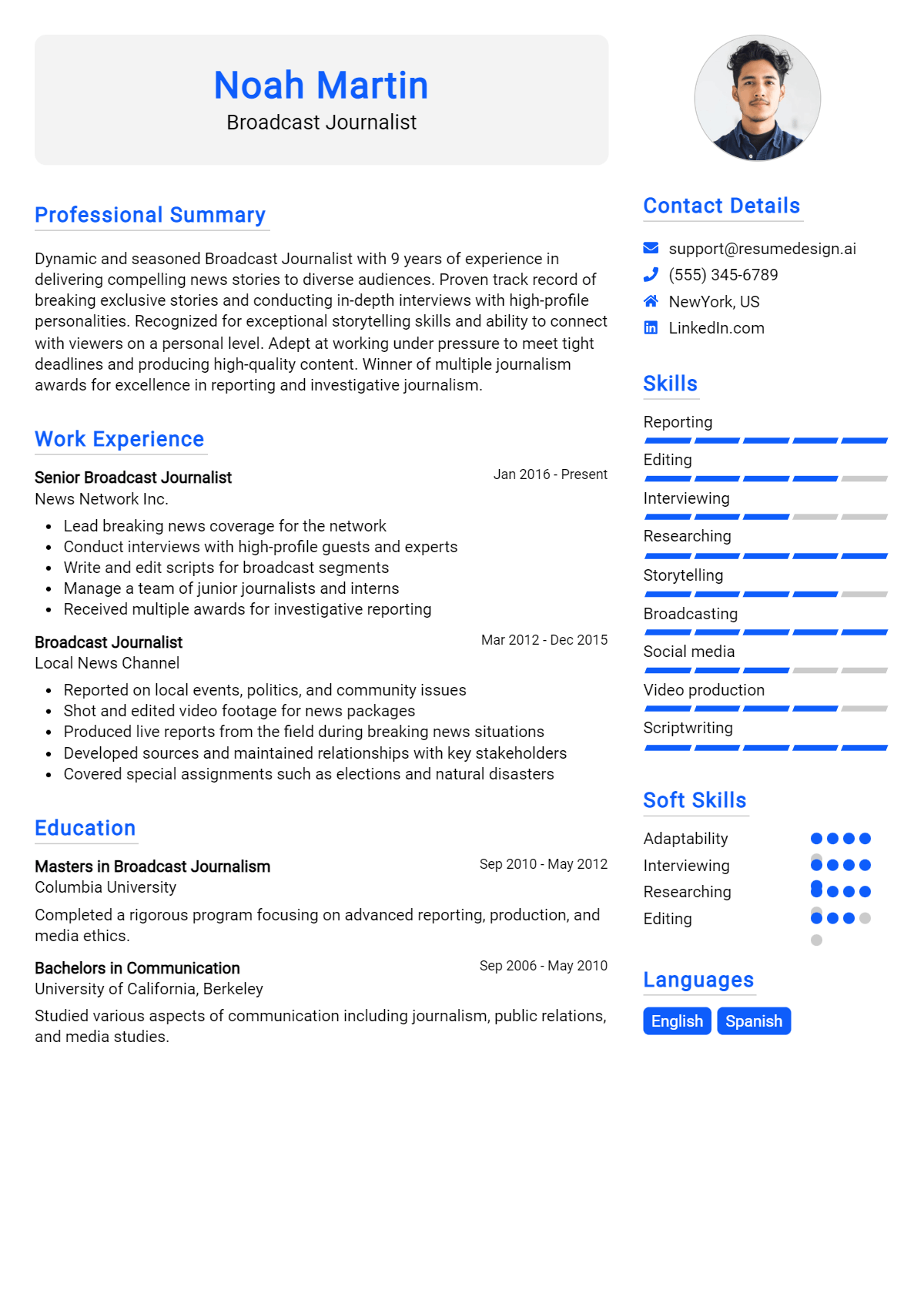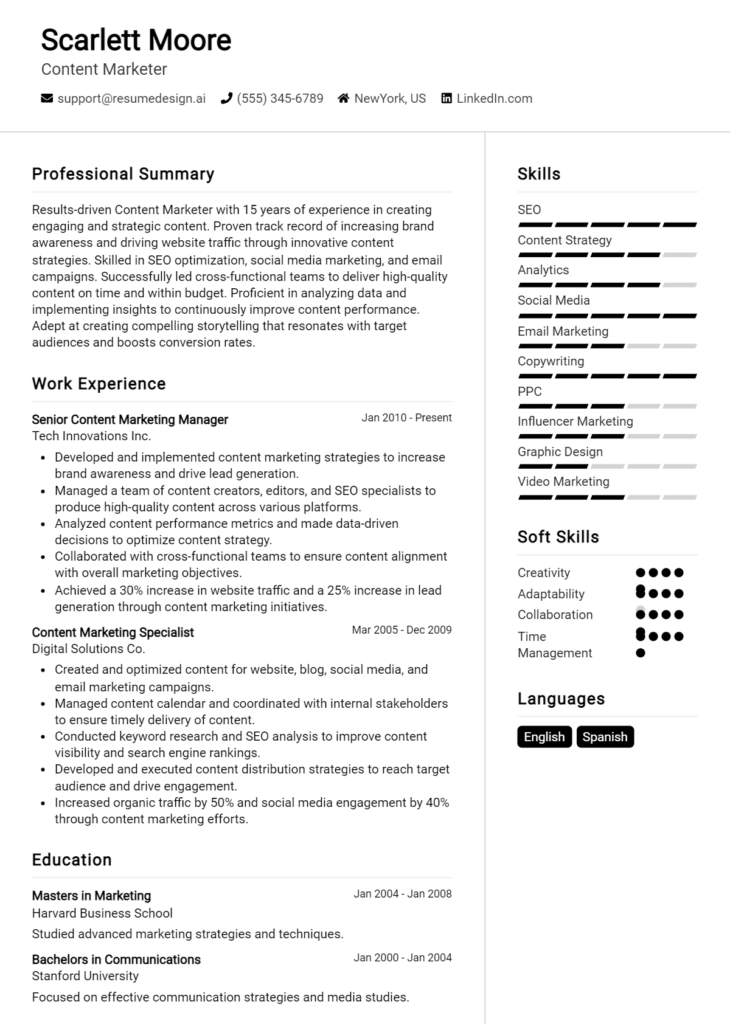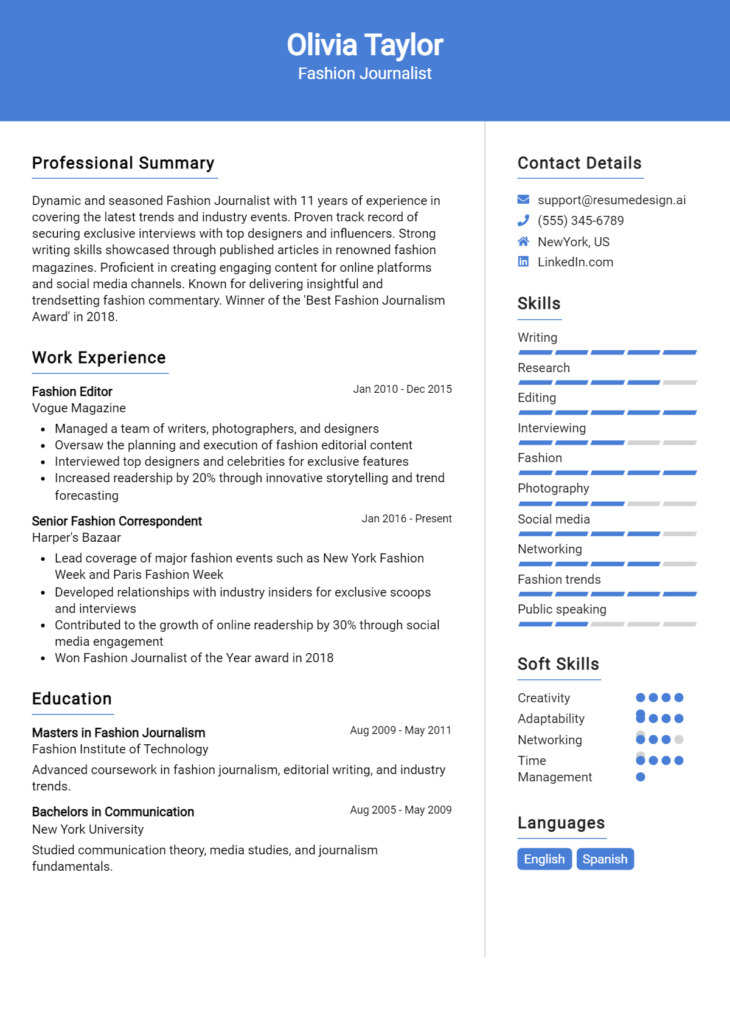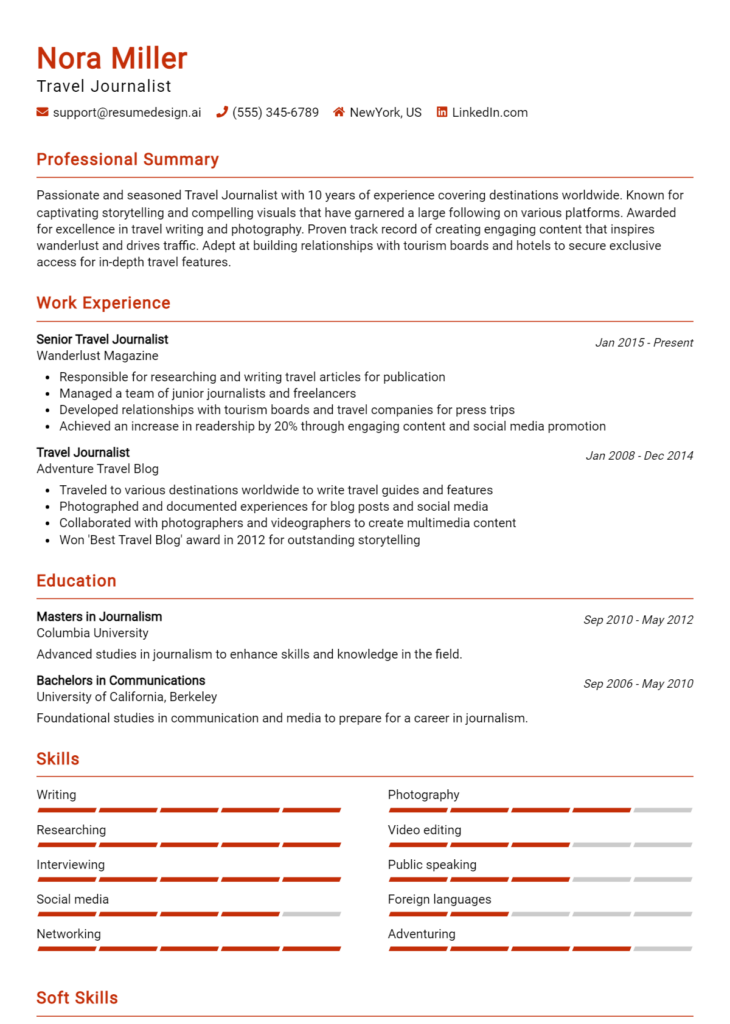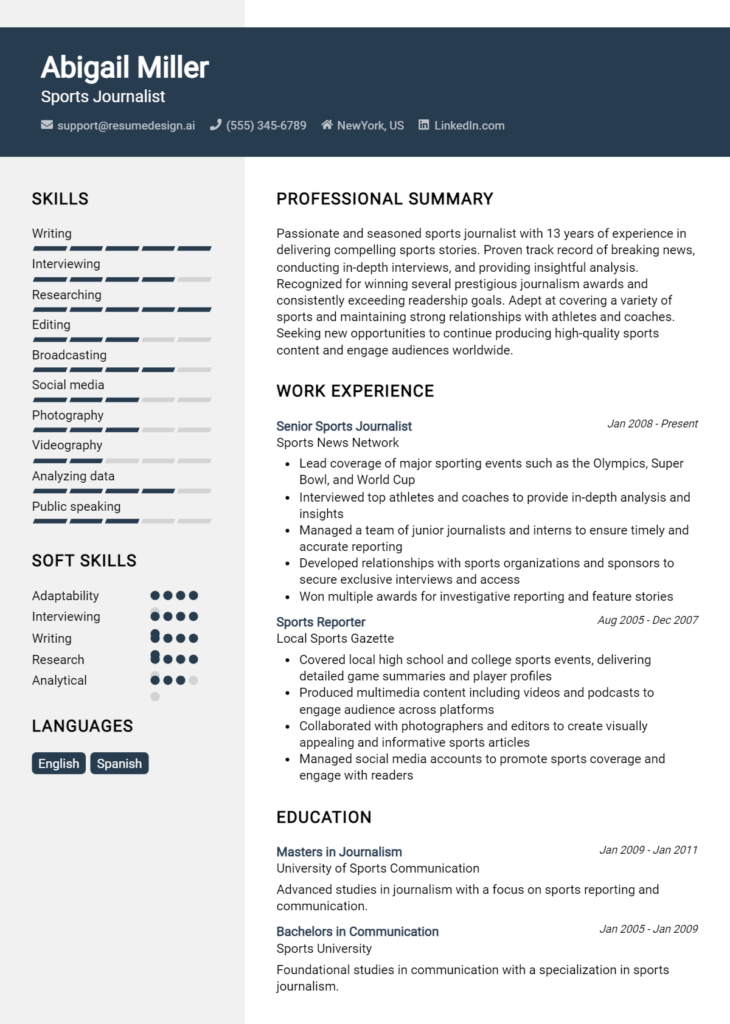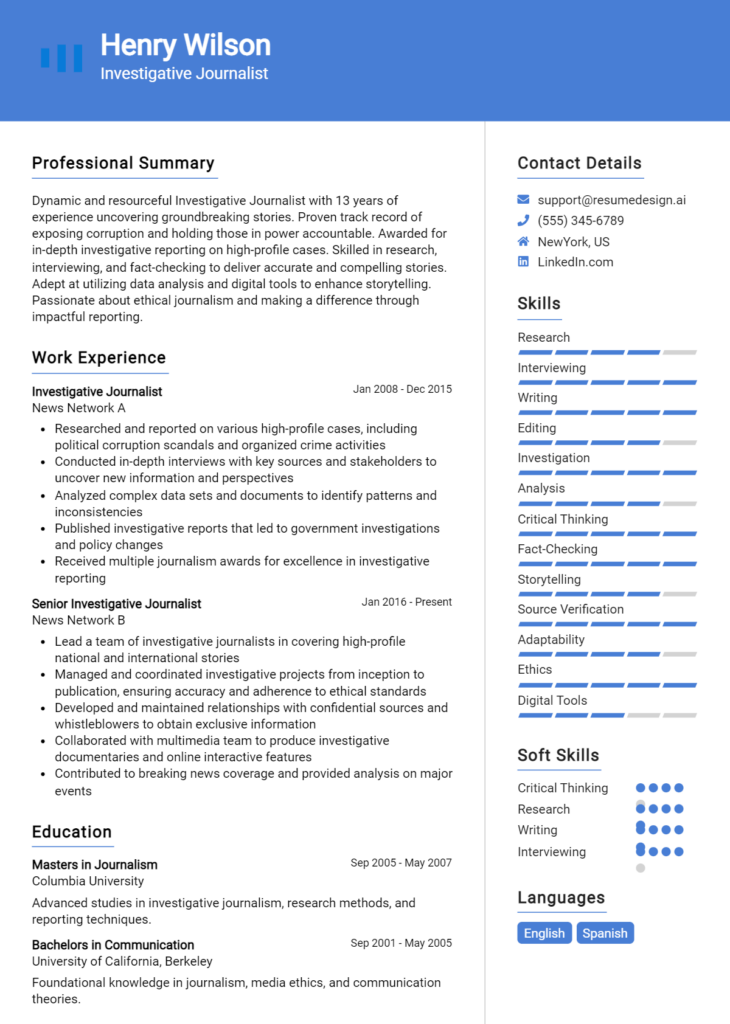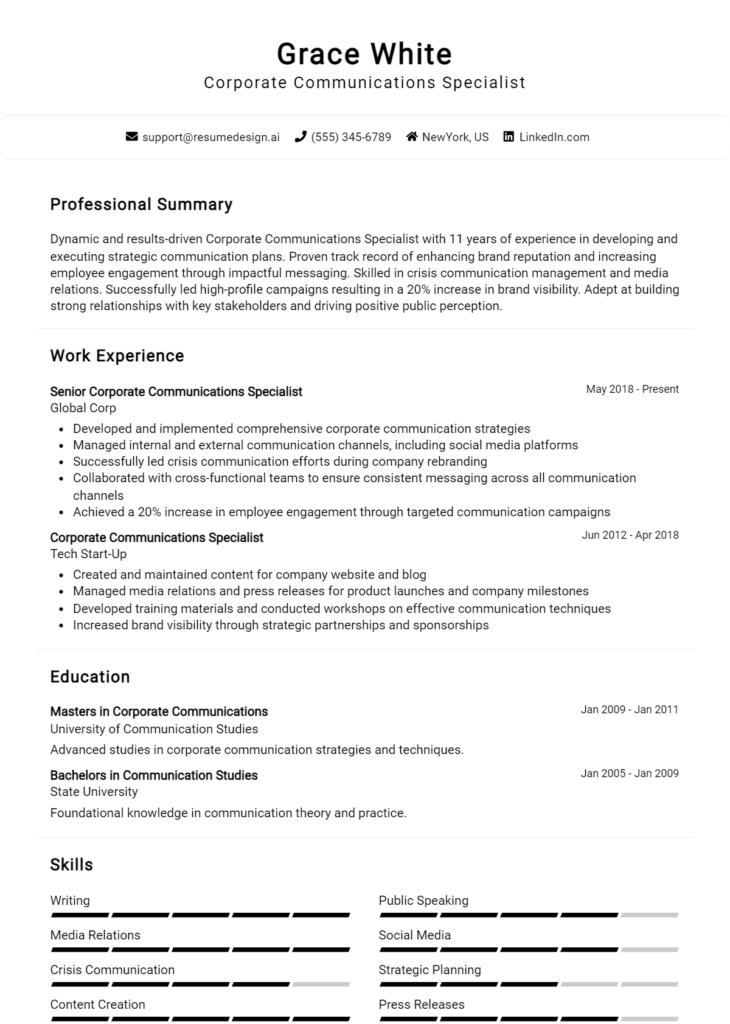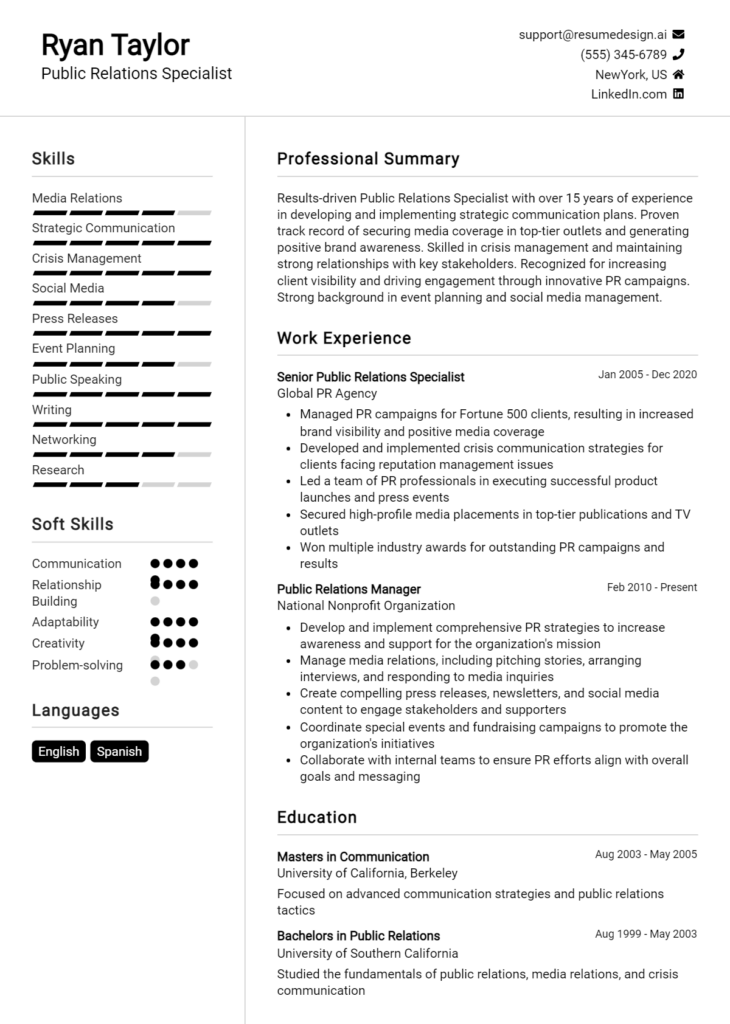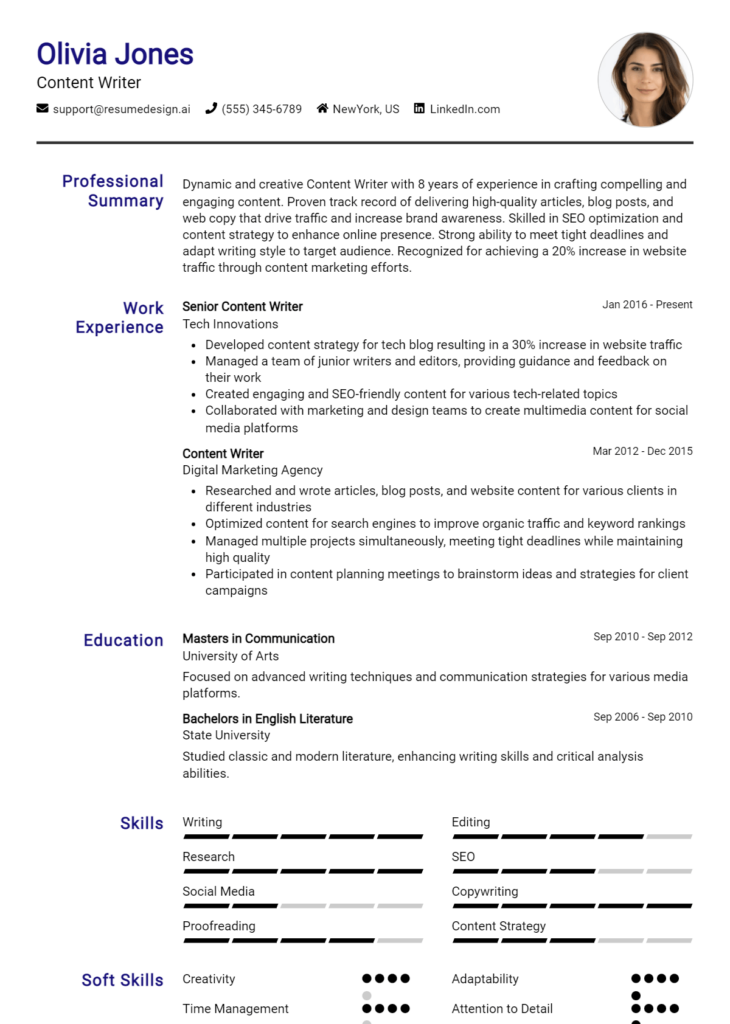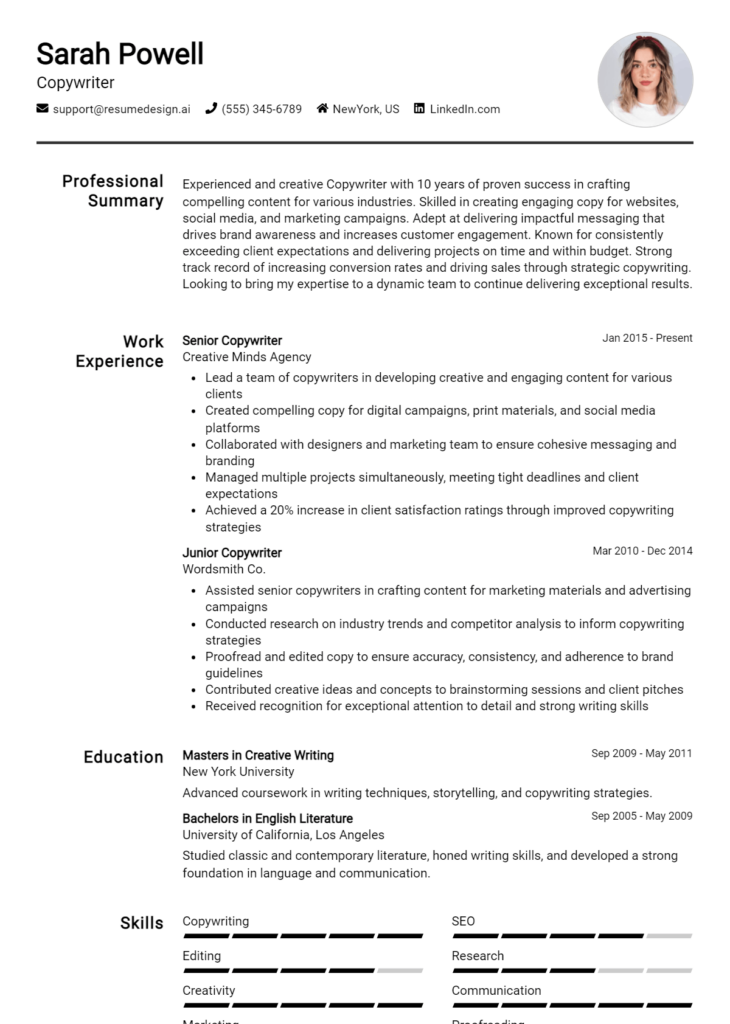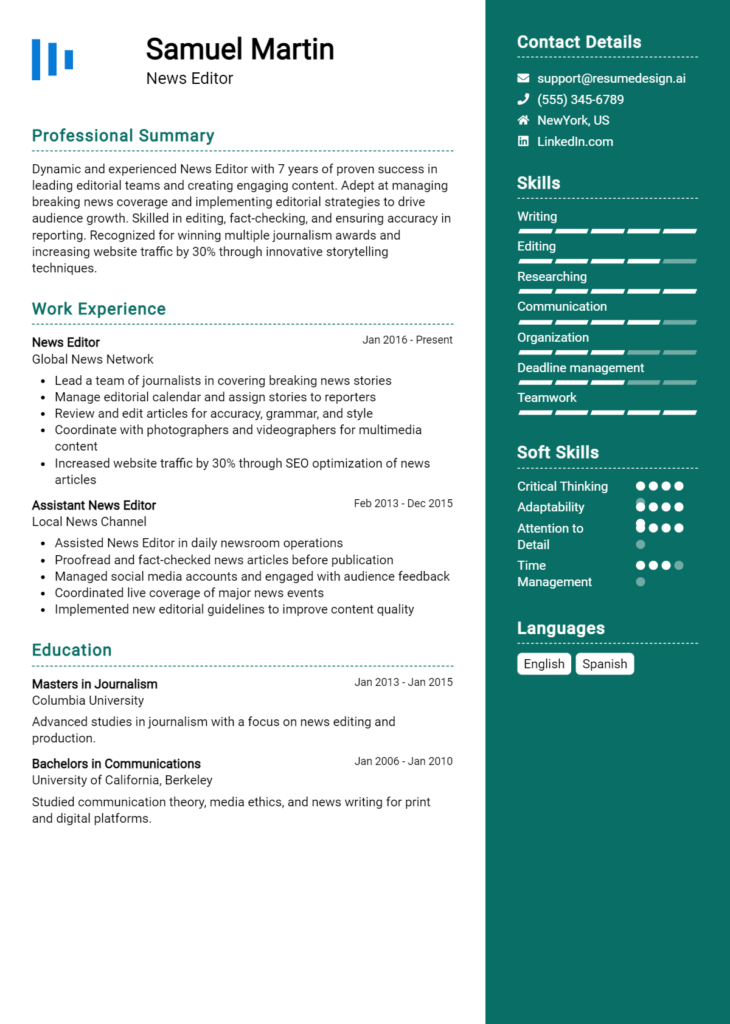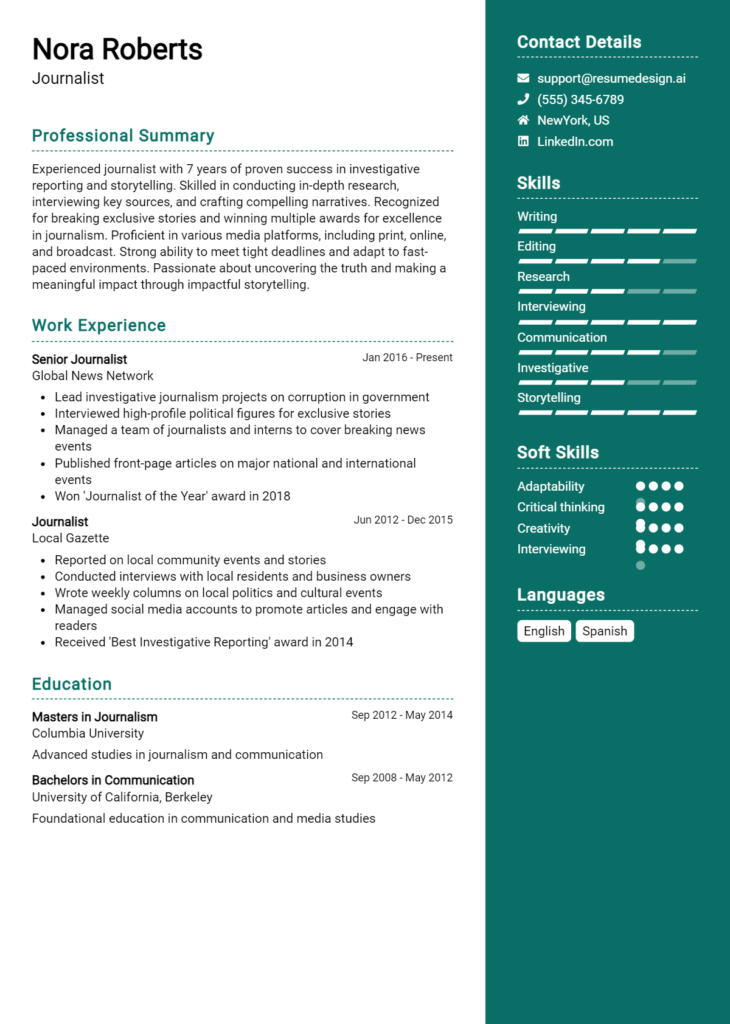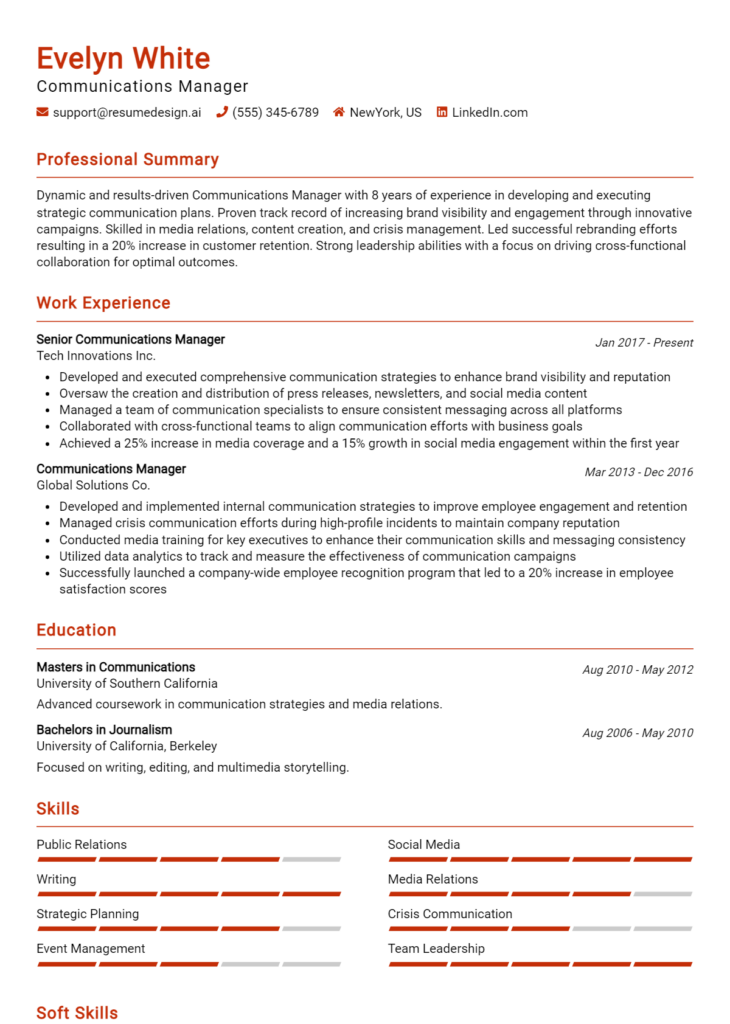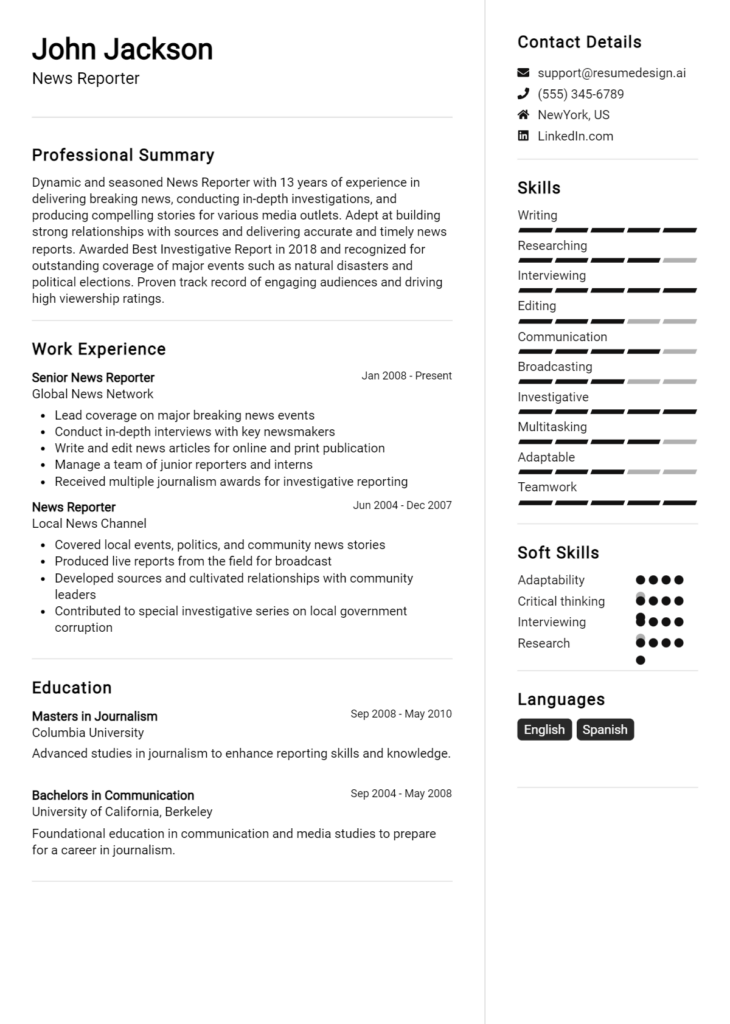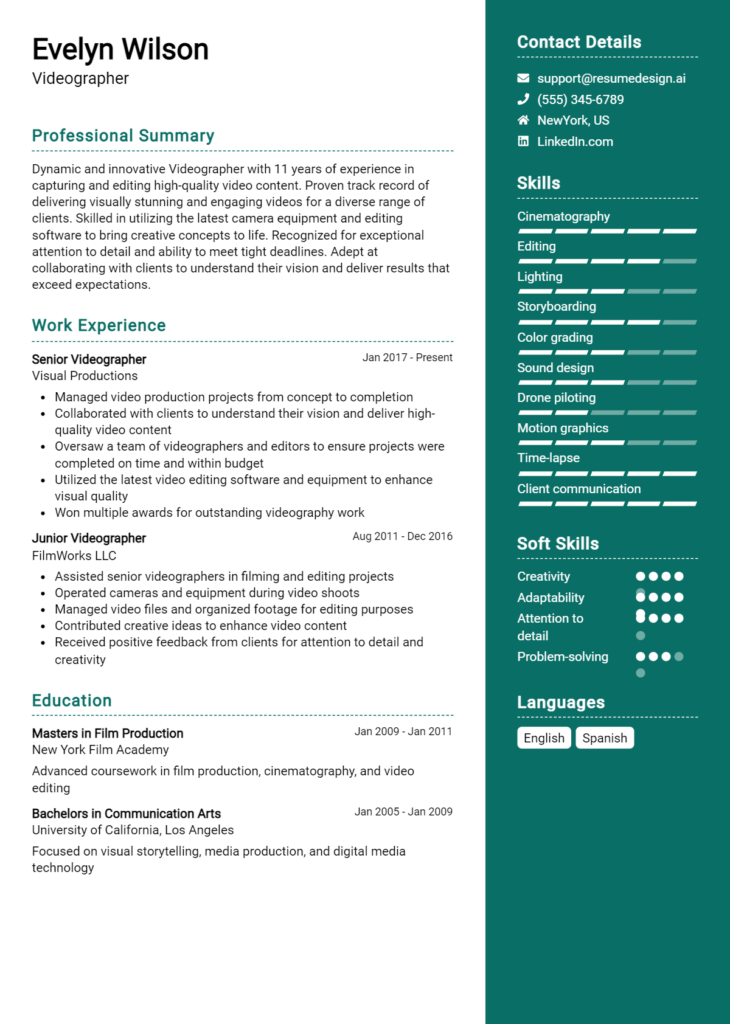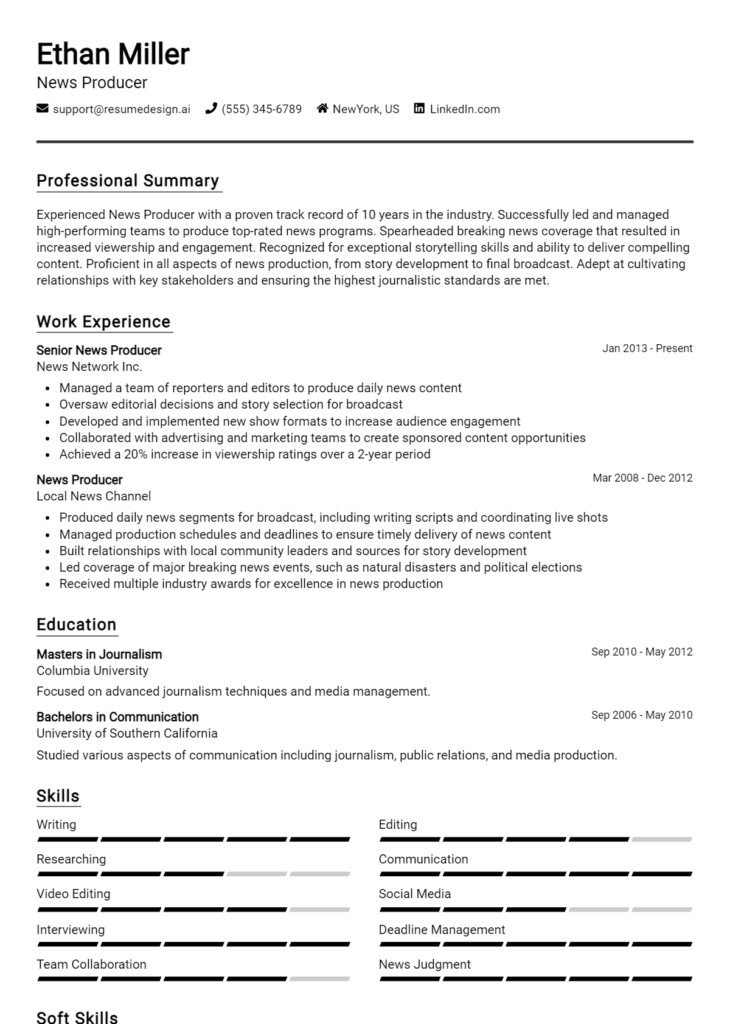Broadcast Journalist Core Responsibilities
Broadcast journalists are responsible for researching, writing, and reporting news stories across various media platforms, acting as a crucial link between editorial, technical, and operational departments. They must possess strong communication, investigative, and storytelling skills, alongside technical proficiency in broadcasting equipment and software. Problem-solving abilities are essential for navigating challenges in fast-paced environments, directly contributing to the organization's goals. A well-structured resume can effectively showcase these skills, highlighting their importance in the competitive media landscape.
Common Responsibilities Listed on Broadcast Journalist Resume
- Researching and verifying news stories from credible sources.
- Writing scripts and preparing content for broadcasts.
- Conducting interviews with sources and experts.
- Reporting live on location during breaking news events.
- Editing video and audio content for clarity and engagement.
- Collaborating with producers and technical staff.
- Utilizing social media platforms to gather and share news.
- Adhering to journalistic ethics and standards.
- Monitoring news trends and audience feedback.
- Participating in editorial meetings to pitch story ideas.
- Developing and maintaining contacts in the community.
- Ensuring compliance with broadcasting regulations.
High-Level Resume Tips for Broadcast Journalist Professionals
A well-crafted resume is crucial for Broadcast Journalist professionals, as it often serves as the first impression a candidate makes on potential employers. In a competitive industry where storytelling and communication skills are paramount, your resume must not only showcase your experience but also effectively reflect your skills and achievements. It should convey your unique voice and personality, much like the stories you cover. This guide will provide practical and actionable resume tips specifically tailored for Broadcast Journalist professionals, ensuring that your application stands out in the ever-evolving media landscape.
Top Resume Tips for Broadcast Journalist Professionals
- Tailor your resume to match the job description, using relevant keywords to align with the employer's needs.
- Showcase your relevant experience, including internships, freelance work, and volunteer positions in journalism.
- Quantify your achievements, such as audience reach, ratings improvement, or successful projects completed.
- Highlight industry-specific skills, such as video editing, social media management, and multimedia storytelling.
- Include a strong summary statement that encapsulates your professional identity and unique contributions to journalism.
- Utilize a clean and professional layout that enhances readability and allows for easy navigation of your credentials.
- Incorporate links to your portfolio, demo reels, or published work to provide tangible evidence of your abilities.
- Keep your resume concise; aim for one page unless you have extensive experience that necessitates additional length.
- Use active language and strong action verbs to convey your contributions and impact in previous roles.
- Proofread for grammar and spelling errors, as attention to detail is critical in journalism.
By implementing these tips, you can significantly enhance your chances of landing a job in the Broadcast Journalist field. A well-structured resume that highlights your skills and accomplishments not only reflects your professionalism but also increases your appeal to hiring managers looking for the next great storyteller.
Why Resume Headlines & Titles are Important for Broadcast Journalist
In the competitive field of broadcast journalism, a well-crafted resume is essential for standing out among numerous applicants. One of the most critical elements of a resume is the headline or title, which serves as the first impression hiring managers will have of a candidate. A strong resume headline can immediately grab attention and succinctly summarize key qualifications, making it easier for employers to assess a candidate's fit for the role. An effective headline should be concise, relevant, and directly related to the specific job being applied for, ensuring that it resonates with the needs and expectations of potential employers.
Best Practices for Crafting Resume Headlines for Broadcast Journalist
- Keep it concise: Aim for one impactful phrase that encapsulates your qualifications.
- Be role-specific: Tailor your headline to the specific job title you are applying for.
- Highlight key skills: Include your most relevant skills or areas of expertise in the headline.
- Use action verbs: Start with dynamic action verbs to convey a sense of proactivity and engagement.
- Show measurable achievements: Incorporate quantifiable successes to stand out from other applicants.
- Maintain professionalism: Ensure the tone is formal and appropriate for the industry.
- Avoid jargon: Use clear language that can be easily understood by hiring managers.
- Test different variations: Experiment with multiple headlines to find the most effective one.
Example Resume Headlines for Broadcast Journalist
Strong Resume Headlines
Dynamic Broadcast Journalist with 5+ Years of Experience in Investigative Reporting
Award-Winning Multimedia Journalist Specializing in Live Event Coverage
Creative Storyteller and Experienced Anchor with a Passion for Community News
Results-Driven Reporter with Proven Success in Digital Content Creation
Weak Resume Headlines
Journalist Looking for Job
Experienced Professional Seeking Opportunities
Broadcast Journalist
Strong headlines are effective because they immediately convey a candidate's unique value proposition and relevant experience, while also capturing the essence of their professional identity in a compelling way. In contrast, weak headlines fail to impress because they lack specificity and do not highlight what makes the candidate stand out, leaving hiring managers with little motivation to delve deeper into the resume. A focused and impactful headline can make all the difference in securing an interview in the competitive landscape of broadcast journalism.
Writing an Exceptional Broadcast Journalist Resume Summary
A well-crafted resume summary is crucial for a Broadcast Journalist, as it serves as the first impression for potential employers. This brief yet impactful section quickly captures the attention of hiring managers by showcasing a candidate's key skills, experience, and accomplishments relevant to the role. A strong summary not only highlights the journalist's unique qualifications but also aligns with the specific job they are applying for, making it easier for recruiters to see the candidate's fit for the position. Conciseness is key; a resume summary should be a powerful snapshot that entices further reading.
Best Practices for Writing a Broadcast Journalist Resume Summary
- Quantify achievements where possible to showcase impact, such as audience growth or successful projects.
- Focus on relevant skills, including storytelling, interviewing, and digital media proficiency.
- Tailor the summary to the job description, using keywords and phrases from the posting.
- Keep it concise, ideally 2-4 sentences that summarize your qualifications effectively.
- Highlight any awards, recognitions, or notable contributions in the field.
- Showcase your adaptability and ability to work under pressure, which are vital in broadcasting.
- Use active language to convey confidence and proactivity.
- Reflect your passion for journalism and commitment to delivering accurate, engaging news content.
Example Broadcast Journalist Resume Summaries
Strong Resume Summaries
Dynamic Broadcast Journalist with over 5 years of experience reporting on local and national news. Successfully increased viewership by 30% through engaging storytelling and innovative digital content strategies.
Award-winning journalist skilled in investigative reporting and live broadcasting. Produced over 200 hours of live news coverage, contributing to a 25% rise in audience engagement and recognition for excellence in journalism.
Versatile Multimedia Journalist with expertise in video production and social media outreach. Developed a series of viral news segments that generated over 1 million views, enhancing the station's online presence significantly.
Weak Resume Summaries
Experienced journalist looking for a new opportunity in broadcasting.
I have worked in news for several years and have various skills related to journalism.
The strong resume summaries demonstrate clear achievements and specific skills relevant to the Broadcast Journalist role, providing quantifiable outcomes that highlight the candidate's impact in their previous positions. In contrast, the weak summaries are vague, lack detail, and do not effectively convey the candidate's unique qualifications or contributions, making them less compelling to hiring managers.
Work Experience Section for Broadcast Journalist Resume
The work experience section of a Broadcast Journalist resume is crucial as it serves as a platform to demonstrate the candidate's technical skills, leadership capabilities, and commitment to delivering high-quality journalistic products. This section provides prospective employers with insight into the candidate's hands-on experience in various broadcasting environments, showcasing their ability to manage teams, navigate tight deadlines, and produce impactful stories. It is vital to quantify achievements and align experiences with industry standards to effectively highlight the candidate's contributions and potential value to a news organization.
Best Practices for Broadcast Journalist Work Experience
- Highlight relevant technical skills such as video editing, audio production, and broadcast software proficiency.
- Quantify achievements with specific numbers, such as audience reach, ratings improvement, or successful project completions.
- Include leadership experiences, emphasizing team management and project coordination.
- Focus on collaboration, detailing partnerships with other departments like marketing and digital media.
- Tailor the work experience to reflect industry trends and the specific requirements of each job application.
- Use action verbs and concise language to convey accomplishments clearly and professionally.
- Showcase adaptability by including experiences in various formats, such as live reporting, investigative journalism, or digital content creation.
- Incorporate feedback or accolades received from peers or superiors to bolster credibility.
Example Work Experiences for Broadcast Journalist
Strong Experiences
- Produced a weekly investigative segment that increased viewership by 25%, leading to a nomination for the regional Emmy Awards.
- Managed a team of 5 reporters and editors during a high-profile election coverage, resulting in a 30% increase in audience engagement on digital platforms.
- Implemented new video editing software that improved production efficiency by 40%, reducing turnaround time for news segments.
- Collaborated with the marketing team to launch a social media campaign that boosted online followers by 50% in three months.
Weak Experiences
- Worked on various stories and projects during time at the station.
- Helped with editing and producing content occasionally.
- Participated in team meetings and contributed to discussions.
- Assisted with social media posts for the news department.
The examples of strong experiences are considered effective because they demonstrate quantifiable outcomes, clear leadership roles, and impactful collaboration, making the candidate stand out. In contrast, the weak experiences lack specificity, measurable achievements, and concrete responsibilities, failing to provide a compelling narrative that showcases the candidate's capabilities or contributions to the organization.
Education and Certifications Section for Broadcast Journalist Resume
The education and certifications section of a Broadcast Journalist resume is crucial in establishing a candidate's academic foundation and professional credibility. This section not only showcases relevant degrees and coursework but also highlights industry-recognized certifications and ongoing learning efforts. By providing detailed information on specialized training and relevant subjects, candidates can demonstrate their commitment to the field and their preparedness for the demands of broadcast journalism. A well-crafted education and certifications section can significantly enhance a candidate's appeal to potential employers, aligning their qualifications with the expectations of the job role.
Best Practices for Broadcast Journalist Education and Certifications
- Highlight degrees that are directly related to journalism, communications, or media studies.
- Include industry-recognized certifications such as those from the National Association of Broadcasters (NAB) or the Radio Television Digital News Association (RTDNA).
- Provide specific coursework that aligns with the skills needed in broadcast journalism, such as investigative reporting or multimedia production.
- List any specialized training in digital journalism, video editing, or broadcasting software.
- Keep the education and certifications section concise but informative, focusing on relevancy.
- Incorporate honors or awards received during academic pursuits to demonstrate excellence.
- Regularly update this section to reflect new qualifications or training completed.
- Ensure clarity and readability by using bullet points and consistent formatting.
Example Education and Certifications for Broadcast Journalist
Strong Examples
- Bachelor of Arts in Journalism, University of California, Los Angeles (UCLA), 2020
- Certified Broadcast Journalist (CBJ), National Association of Broadcasters, 2021
- Coursework in Investigative Reporting, Advanced Media Production, and Digital Storytelling
- Certificate in Media Ethics, Online Course by the Poynter Institute, 2022
Weak Examples
- Bachelor of Arts in History, State University, 1995
- Certification in Microsoft Office Suite, 2019
- Coursework in Basic Computer Skills, Community College, 2000
- High School Diploma, Local High School, 1991
The strong examples are considered effective because they include relevant degrees and certifications that directly pertain to the field of broadcast journalism, showcasing a solid foundation in both theory and practice. They reflect recent and specialized training that enhances the candidate's skill set. Conversely, the weak examples illustrate qualifications that are outdated or not pertinent to the role, such as degrees in unrelated fields or certifications that do not add value to a broadcast journalist's capabilities, ultimately diminishing the candidate's attractiveness to potential employers.
Top Skills & Keywords for Broadcast Journalist Resume
As a Broadcast Journalist, possessing the right skills is paramount for crafting a compelling resume that stands out in a competitive job market. These skills not only demonstrate your capability to gather and report news effectively but also highlight your ability to engage with diverse audiences and adapt to the fast-paced nature of the industry. A well-structured resume featuring key skills can significantly enhance your chances of landing an interview. In this field, both hard and soft skills play a crucial role, showcasing your technical expertise as well as your interpersonal abilities.
Top Hard & Soft Skills for Broadcast Journalist
Soft Skills
- Excellent communication skills
- Strong storytelling ability
- Adaptability in fast-paced environments
- Critical thinking and analytical skills
- Team collaboration and leadership
- Attention to detail
- Empathy and emotional intelligence
- Time management and organizational skills
- Networking and relationship building
- Cultural awareness and sensitivity
Hard Skills
- Proficient in video editing software (e.g., Adobe Premiere Pro, Final Cut Pro)
- Strong writing and reporting skills
- Knowledge of digital journalism tools and platforms
- Familiarity with news gathering techniques
- On-camera presentation skills
- Understanding of media law and ethics
- Experience with social media and online content creation
- Proficient in audio editing and production
- Familiarity with teleprompter operation
- Ability to conduct interviews and gather information effectively
For a more comprehensive overview of how to effectively incorporate these skills into your resume, along with other essential elements like work experience, you can explore additional resources.
Stand Out with a Winning Broadcast Journalist Cover Letter
As an enthusiastic and dedicated broadcast journalist with over five years of experience in dynamic news environments, I am excited to apply for the Broadcast Journalist position at [Company Name]. My background in investigative reporting, coupled with my ability to engage audiences through compelling storytelling, uniquely positions me to contribute to your team. I have a proven track record of delivering high-quality content that informs and captivates viewers, and I am eager to bring my skills to [Company Name] to help elevate your news coverage.
Throughout my career, I have developed a strong ability to research and analyze complex issues, allowing me to produce in-depth reports that resonate with diverse audiences. For instance, in my previous role at [Previous Employer], I led a team that uncovered significant local government discrepancies, resulting in widespread public interest and follow-up investigations. My experience in live reporting has honed my ability to think on my feet and adapt to ever-changing news cycles, ensuring that I can deliver accurate and timely information under pressure.
I pride myself on my strong communication skills and my commitment to ethical journalism. I am adept at building relationships with sources and community members, which has been instrumental in gaining insights that enhance my reporting. My technical proficiency with video editing software and broadcasting equipment enables me to produce polished segments that align with the high standards of [Company Name]. I am particularly drawn to your organization’s commitment to investigative journalism and community engagement, and I am excited about the opportunity to contribute my passion and expertise to your esteemed team.
Thank you for considering my application. I look forward to the opportunity to discuss how my background, skills, and enthusiasm for broadcast journalism can align with the goals of [Company Name]. I am eager to bring my innovative approach to storytelling and my dedication to journalistic integrity to your newsroom.
Common Mistakes to Avoid in a Broadcast Journalist Resume
When crafting a resume for a broadcast journalist position, it's essential to present a polished and professional document that captures your skills and experience effectively. However, many candidates fall into common pitfalls that can detract from their qualifications. Understanding these mistakes can help you create a standout resume that highlights your strengths and sets you apart in a competitive field. Here are several common errors to avoid:
Lack of Specificity: Failing to provide specific examples of your work can make your resume vague. Instead of saying you covered various stories, mention key events and your role in reporting them.
Ignoring Keywords: Not including relevant industry keywords can hinder your chances of passing through automated applicant tracking systems. Research job postings to identify important terms and incorporate them into your resume.
Overloading with Jargon: While industry terminology can demonstrate your expertise, overusing jargon may alienate readers. Aim for a balance that showcases your knowledge without sacrificing clarity.
Neglecting to Highlight Multimedia Skills: In today’s digital landscape, it’s crucial to showcase your ability to work across various platforms. Failing to mention skills like video editing, social media proficiency, or podcasting can weaken your application.
Using a Generic Template: A one-size-fits-all resume can come across as unoriginal. Tailor your resume layout and content to reflect your unique style and the specific requirements of the broadcast journalism role.
Omitting Soft Skills: Broadcast journalism requires excellent communication and interpersonal skills. Not highlighting these attributes may leave your resume lacking in demonstrating your suitability for on-air roles.
Typos and Grammatical Errors: Attention to detail is critical in journalism. Submitting a resume with mistakes can create a negative impression and suggest a lack of professionalism.
Failure to Showcase Achievements: Instead of just listing job responsibilities, focus on quantifiable achievements. Highlighting awards, audience engagement metrics, or successful projects can significantly strengthen your resume.
Conclusion
As a Broadcast Journalist, your ability to deliver news effectively and engagingly is paramount. Throughout this article, we explored the essential skills required for the role, including strong communication, research capabilities, and technical proficiency in using broadcasting equipment. We also discussed the importance of adaptability in this fast-paced field, as well as the need for ethical journalism and the ability to work under tight deadlines.
To ensure you stand out in this competitive industry, it's crucial to have a polished resume that highlights your experience and skills effectively. Take the time to review your Broadcast Journalist resume, ensuring it reflects your unique qualifications and achievements.
If you're looking for resources to help you create or update your resume, consider using tools such as resume templates to get started, or explore the resume builder for an easy, guided experience. Additionally, looking at resume examples can provide inspiration and insight into what works well in the industry. Don't forget to craft a compelling narrative about your experiences with the help of cover letter templates to complement your resume.
Take action now and ensure your application materials reflect your best self as a Broadcast Journalist!

